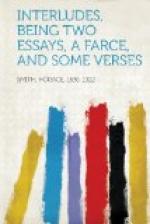minimis non curat lex.” But the doctrine
is dangerous, and I doubt if anything in this world
is absolutely immaterial. De Quincey mentions
the case of a man who committed a murder, which at
the time he thought little about, but he was led on
from that to gambling and Sabbath breaking. Probably
in this weary world any indulgence or pleasure which
is not bad is not indifferent, but absolutely good.
The world is not so bright, so comfortable, so pleasant,
that we can afford to scorn the good the gods provide
us. In Mr. Reade’s book on Study and
Stimulants, Matthew Arnold says, a moderate use
of wine adds to the agreeableness of life, and whatever
adds to the agreeableness of life, adds to its resources
and powers. There cannot be a doubt that the
bodily frame is capable of being wearied, and that
it needs repose and refreshment, and this is a law
which a man trifles with at his peril. The same
is true of the intellectual and moral faculties.
They claim rest and refreshment; they must have comfort
and pleasure or they will begin to flag. It must
also be always remembered that in the every-day work
of this world the body and the mind have to go through
a great deal which is depressing and taxing to the
energy, and a certain amount of “set off”
is required to keep the balance even. We must
remember this especially with respect to the poor.
Pipes and cigars may be a luxury to the idle and rich,
but we ought not to grudge a pipe to a poor man who
is overworked and miserable. Some degree of comfort
we all feel to be at times essential when we have
a comfortless task to perform. With good food
and sleep, for instance, we can get through the roughest
work; with the relaxation of pleasant society we can
do the most tedious daily work. If, on the other
hand, we are worried and uncomfortable, we become
unfitted for our business. We all have our troubles
to contend against, and we require comfort, relaxation,
stimulation of some sort to help us in the battle.
There are certain duties which most of us have to
perform, and which, to use a common expression, “take
it out of us.” Thus most of us are compelled
to travel more or less. An old gentleman travelling
by coach on a long journey wished to sleep off the
tediousness of the night, but his travelling companion
woke him up every ten minutes with the inquiry, “Well,
sir, how are you by this.” At last the
old gentleman’s patience was fairly tired out.
“I was very well when I got into the coach,
and I’m very well now, and if any change takes
place I’ll let you know.” I was
coming from London to Beckenham, and in the carriage
with me was a gentleman quietly and attentively reading
the newspaper. A lady opposite to him, whenever
we came to a station, cried out, “Oh, what station’s
this, what station’s this?” Being told,
she subsided, more or less, till the next station.
The gentleman’s patience was at last exhausted.
“If there is any particular station
at which you wish to alight I will inform you when
we arrive.”




